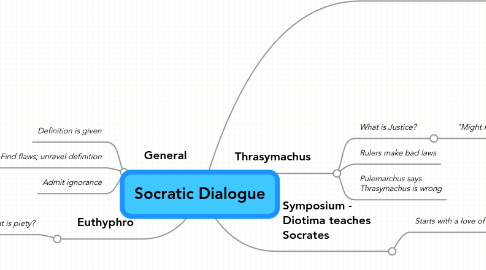Socratic Dialogue
by Geffen Kozikaro


1. General
1.1. Definition is given
1.2. Find flaws; unravel definition
1.3. Admit ignorance
2. Euthyphro
2.1. What is piety?
2.1.1. That which is loved by the Gods
2.1.1.1. Some things loved by Gods
2.1.2. They love just humans actions
2.1.2.1. Is it loved because it is holy or holy because it is loved?
2.1.3. Give a service to the Gods
2.1.3.1. Prayers only ask of them
2.1.3.2. Sacrifices only give back to them
3. Thrasymachus
3.1. What is Justice?
3.1.1. "Might Makes Right"
3.2. Rulers make bad laws
3.3. Pulemarchus says Thrasymachus is wrong
4. Symposium - Diotima teaches Socrates
4.1. Starts with a love of physical things
4.1.1. Becomes a love of virtue
4.1.1.1. Courage
4.1.1.2. Temperance
4.1.1.3. Prudence
4.1.1.4. Justice
5. The Meno: What is Virtue?
5.1. Meno asks Socrates whether virtue is aquired through teaching, practice, or by nature.
5.2. First Definition: Meno says it is different for everyone. "Man is the measure of all things."
5.2.1. Socrates demands one definition of virtue
5.2.1.1. Uses examples from nature
5.3. Second Definition: Meno says virtue is the power of governing mankind
5.3.1. Problem: Slaves and children don't have power
5.3.2. Problem: Definition doesn't discuss justice
5.4. Third Definition: Meno says virtue is the desire of things honorable and the power of attainting them.
5.4.1. Problem: Definition doesn't discuss temperance, the act of avoiding excess; How do you know when you have enough "things" and power?
